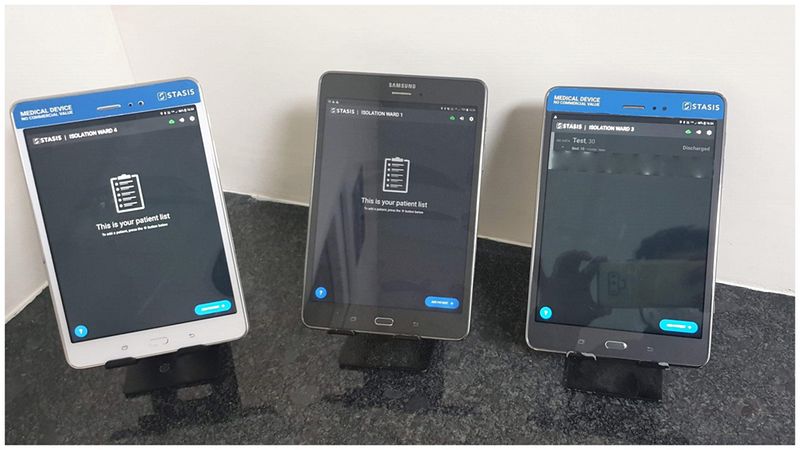As Bengaluru braces for a surge in COVID-19 cases, hospitals are using an Indian startup's cutting-edge remote patient monitoring system to set up isolation wards to manage the increased demand. Medical experts predict that the city's intensive care units (ICU) will be overwhelmed at the peak of the pandemic and the highly infectious disease will pose serious threats to both medical workers and other hospital patients.
To counter this, Ramaiah Medical College Hospital (RMCH) and Stasis have teamed up to set up remote monitored isolation wards to manage suspected and confirmed cases of COVID-19, while protecting their healthcare workers and other hospitalized patients from unnecessary exposure. By allowing medical workers to remotely monitor patients on their smartphone, laptop or central monitors, remote patient monitoring significantly reduces the frequency of contact with suspected and confirmed COVID-19 patients thereby protecting the staff and reducing the requirement for PPEs, which are in short supply.
"We have equipped our isolation wards with Stasis to ensure the highest level of care and patient safety, while also protecting our staff and doctors from unnecessary exposure to Covid-19," says Dr. Anil Kumar, Prof & HOD, Internal Medicine, RMCH. "With a remote patient monitoring solution like Stasis, we were able to set-up a central monitoring station on a different floor to ensure our doctors can manage these cases without having to be in the ward."
Stasis has a remote patient monitoring system that measures key vital parameters like heart rate, oxygen saturation, respiratory rate, skin temperature, electrocardiogram and non-invasive blood pressure. This solution can be easily deployed in any care setting - be it hospitals, homes or even hotels - to keep doctors and nurses informed about the real-time status of their patients. It automates the collection of data to a central nursing station display, and doctors can access the data remotely, in real time, with the Stasis Smartphone App.
"Stasis was able to implement their solution within a few hours, with minimal IT support and infrastructure requirement. This is ideal for us as our isolation wards have been set up away from the main hospital to protect those patients that come here for emergency care," says Dr. Harish K, Associate Dean, RMCH. "We also have to work with reduced staffing, which is possible with Stasis as it automates data collection and risk scoring, and has AI-driven proactive notifications to identify patient deterioration early. This is a big advantage of having a solution like Stasis."
RMCH has been using Stasis connected care for its Acute Medicine Ward since 2017. As an early adopter of the solution, they have seen significant benefits with the use of a smart remote monitoring solution in terms of improved patient care, better resource utilization and increased patient affordability of care.
RMCH has now added connected care to 16 new isolation beds to manage severe cases of COVID-19 that need close monitoring without escalation to the ICU. "When we were planning the set-up of our isolation wards, it was an easy decision for us to use Stasis. Our clinicians and nurses have used it in the past and are comfortable managing patients remotely through their smartphones. With the flexibility that Stasis provides, we have been able to set-up a central monitoring screen where clinicians can manage COVID-19 patients effectively," says Dr. Naresh Shetty, President, Ramaiah Memorial Hospital who is leading the COVID-19 management at Ramaiah Hospitals.
"Due to the nature of the disease, management of illness has to be rethought. Whereas disconnected patient monitors cannot meet the needs of this epidemic, connected care solutions can ensure better patient safety while safeguarding staff and doctors against exposure," says Dr. Roheet Rao, Director of Stasis.
Dr. Roheet adds, "We are actively helping governments, private hospitals, and special projects to design and implement remote patient monitoring, which is the need of the hour. Our customers choose us for the ease of implementation, USFDA cleared clinical accuracy, affordability and above all, the ease with which we can go live and get the right data to the right stakeholder in a timely fashion to save lives."
.

 RMCH has been using Stasis connected care for its Acute Medicine Ward since 2017. As an early adopter of the solution, they have seen significant benefits with the use of a smart remote monitoring solution in terms of improved patient care, better resource utilization and increased patient affordabi
RMCH has been using Stasis connected care for its Acute Medicine Ward since 2017. As an early adopter of the solution, they have seen significant benefits with the use of a smart remote monitoring solution in terms of improved patient care, better resource utilization and increased patient affordabi










.jpeg)








.png)
.png)

.png)
.png)
.png)

.png)
.png)
.png)

.png)
.png)